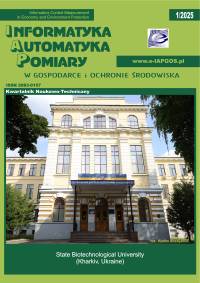ZWIĘKSZENIE WYDAJNOŚCI ENERGETYCZNEJ SPRZĘTU RADIOWEGO W OPARCIU O STOSOWANIE MODULACJI PRZEZ ORTOGONALNE HARMONICZNE
Sergey Toliupa
Taras Shevchenko National University of Kyiv, Department of Cybersecurity and Information Protection (Ukraina)
https://orcid.org/0000-0002-1919-9174
Vladimir Nakonechnyi
Taras Shevchenko National University of Kyiv, Department of Cybersecurity and Information Protection (Ukraina)
https://orcid.org/0000-0002-0247-5400
Alexander Trush
trush.viti@gmail.comTaras Shevchenko National University of Kyiv, Department of Network and Internet Technologies (Ukraina)
https://orcid.org/0000-0001-8473-9387
Abstrakt
Większość wyników teoretycznych, a także metod wykorzystujących modulację OFDM, uzyskuje się w celu zwiększenia szybkości transmisji informacji z ograniczeniami energetycznymi i przepustowością. W przypadku szerokopasmowych systemów dostępu radiowego zadanie to wynika przede wszystkim z komercyjnego celu tych systemów i chęci twórców komunikacji, aby zapewnić szybki bezprzewodowy dostęp do Internetu w jak największym stopniu w tym samym czasie. Artykuł poświęcony jest zwiększeniu wydajności energetycznej urządzeń radiowych z wykorzystaniem modulacji ortogonalnych nośników harmonicznych w warunkach zamierzonego zakłócania i selektywnego opadania częstotliwości, przy jednoczesnym zapewnieniu określonego poziomu niezawodności i prędkości transmisji informacji.
Słowa kluczowe:
komunikacja radiowa, nośna, sygnał, szum, efektywność energetycznaBibliografia
Coleri S., Ergen M., Puri A., Bahai A. : Channel estimation techniques based on pilot arrangement in OFDM systems. IEEE Trans. Broadcast 48(3)/2002, 223–229.
DOI: https://doi.org/10.1109/TBC.2002.804034
Google Scholar
Morelli M.: A Comparison of Pilot-Aided Channel Estimation Methods for OFDM Systems. IEEE Trans. on Signal Processing 49(12)/2001, 3065–3073.
DOI: https://doi.org/10.1109/78.969514
Google Scholar
Kuvshinov O. V.: OFDM technology: an overview of problems and ways of solving them. Communication 1/2008, 42–46.40.
Google Scholar
Pickholtz R. L.: Theory of Spread-Spectrum Communications. IEEE Trans. Commun. Com-30(5)/1982, 855–884.
DOI: https://doi.org/10.1109/TCOM.1982.1095533
Google Scholar
Edfors O., SandellM., van de Beek J. J. et al.: OFDM channel estimation by singular value decomposition. IEEE Trans. Commun. 46(7)/1998, 931–939.
DOI: https://doi.org/10.1109/26.701321
Google Scholar
Li Y.: Robust channel estimation for OFDM systems with rapid dispersive fading channels. IEEE Trans. Commun. 46/1998, 902–915.
DOI: https://doi.org/10.1109/26.701317
Google Scholar
Toliupa S., Gursky T. G., Voskolovich A. I.: An analysis of the method of evaluating the parameters of the channel’s channels in the link. News of the Sovereign to the University of Information Technology 9(3)/2011, 194–204.
Google Scholar
Toliupa S., Babenko T., Parhomenko I.: The method of forming and signal processing aimed at improving stealth and energy efficiency. 2nd International Conference Advanced Information and Communication Technologies (AICT), 2017, 304–308.
DOI: https://doi.org/10.1109/AIACT.2017.8020125
Google Scholar
Gursky T.G.: Mathematical model of radio line using OFDM technology in the conditions of influence of intentional interference. Proceedings of VITI NTU "KPI" 2/2008, 9–16.
Google Scholar
Autorzy
Sergey ToliupaTaras Shevchenko National University of Kyiv, Department of Cybersecurity and Information Protection Ukraina
https://orcid.org/0000-0002-1919-9174
Autorzy
Vladimir NakonechnyiTaras Shevchenko National University of Kyiv, Department of Cybersecurity and Information Protection Ukraina
https://orcid.org/0000-0002-0247-5400
Autorzy
Alexander Trushtrush.viti@gmail.com
Taras Shevchenko National University of Kyiv, Department of Network and Internet Technologies Ukraina
https://orcid.org/0000-0001-8473-9387
Statystyki
Abstract views: 446PDF downloads: 212
Licencja

Utwór dostępny jest na licencji Creative Commons Uznanie autorstwa – Na tych samych warunkach 4.0 Miedzynarodowe.
Inne teksty tego samego autora
- Sergey Toliupa, Yuriy Kravchenko, Aleksander Trush, ORGANIZACJA IMPLEMENTACJI WSZECHOBECNYCH SIECI SENSOROWYCH , Informatyka, Automatyka, Pomiary w Gospodarce i Ochronie Środowiska: Tom 8 Nr 1 (2018)









